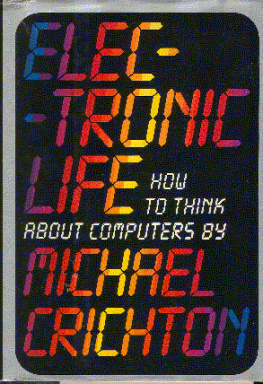Michael Crichton - The Terminal Man
Here you can read online Michael Crichton - The Terminal Man full text of the book (entire story) in english for free. Download pdf and epub, get meaning, cover and reviews about this ebook. genre: Science fiction. Description of the work, (preface) as well as reviews are available. Best literature library LitArk.com created for fans of good reading and offers a wide selection of genres:
Romance novel
Science fiction
Adventure
Detective
Science
History
Home and family
Prose
Art
Politics
Computer
Non-fiction
Religion
Business
Children
Humor
Choose a favorite category and find really read worthwhile books. Enjoy immersion in the world of imagination, feel the emotions of the characters or learn something new for yourself, make an fascinating discovery.
- Book:The Terminal Man
- Author:
- Genre:
- Rating:5 / 5
- Favourites:Add to favourites
- Your mark:
- 100
- 1
- 2
- 3
- 4
- 5
The Terminal Man: summary, description and annotation
We offer to read an annotation, description, summary or preface (depends on what the author of the book "The Terminal Man" wrote himself). If you haven't found the necessary information about the book — write in the comments, we will try to find it.
The Terminal Man — read online for free the complete book (whole text) full work
Below is the text of the book, divided by pages. System saving the place of the last page read, allows you to conveniently read the book "The Terminal Man" online for free, without having to search again every time where you left off. Put a bookmark, and you can go to the page where you finished reading at any time.
Font size:
Interval:
Bookmark:
Michael Crichton
The Terminal Man
To Kurt
Martin J. Nathan, M.D., and Demian Kuffler gave technical advice and assistance. Kay Kolman Tyler prepared the graphics. I am indebted to them all.
Author's Introduction
Readers who find the subject matter of this book shocking or frightening should not delude themselves by also thinking it is something quite new. The physical study of the brain has been proceeding for more than a century; the technology of behavior modification has been developing for more than fifty years. For decades, it was there for anyone to see, discuss, support, or oppose.
Nor has there been any lack of publicity. Research in neurobiology is spectacular enough to appear regularly in the Sunday supplements. But the public has never really taken it seriously. There has been so much ominous talk and so much frivolous speculation for so many years that the public now regards "mind control" as a problem removed to the distant future: it might eventually happen, but not soon, and not in a way that would affect anyone now alive.
Scientists engaged in this research have sought public discussion. James V. McConnell of the University of Michigan told his students some years ago, "Look, we can do these things. We can control behavior. Now, who's going to decide what's to be done? If you don't get busy and tell me how I'm supposed to do it, I'll make up my own mind for you. And then it's too late."
Many people today feel that they live in a world that is predetermined and running along a fixed pre-established course. Past decisions have left us with pollution, depersonalization, and urban blight; somebody else made the decisions for us, and we are stuck with the consequences.
That attitude represents a childish and dangerous denial of responsibility, and everyone should recognize it for what it is. In that spirit, the following chronology is presented:
HISTORY OF THERAPYOF PSYCHOMOTOR EPILEPSY1864 Morel, Fairet, and other French neurologists describe some elements of psychomotor epilepsy.
1888 Hughlings Jackson (Great Britain) provides the classic description of psychomotor epilepsy and its preceding aura.
1898 Jackson and Colman (Great Britain) localize the disorder to the temporal lobe of the brain.
1908 Horsley and Clarke (Great Britain) describe stereotaxic surgical techniques for use on animals.
1941 Jasper and Kershman (U.S.A. and Canada) show that the electroencephalogram of patients with psychomotor epilepsy is characterized by discharges from the temporal lobe.
1947 Spiegel and co-workers (U.S.A.) report the first stereotaxic surgery performed on a human being.
1950 Penfield and Flanagan (Canada) perform ablative surgery for psychomotor epilepsy, with good results.
1953 Heath and co-workers (U.S.A.) perform stereotaxic implantation of depth electrodes.
1958 Talairach and co-workers (France) begin chronic stereotaxic implantation of depth electrodes.
1963 Heath and co-workers (U.S.A.) allow patients to stimulate themselves, at will, via implanted electrodes.
1965 Narabayashi (Japan) reports on 98 patients with violent behavior treated by stereotaxic surgery.
1965 More than 24,000 stereotaxic procedures on human beings have been performed in various countries by this date.
1968 Delgado and co-workers (U.S.A.) attach "stimoceiver" (radio stimulator plus radio receiver) to freely ambulatory hospital patients with psychomotor epilepsy.
1969 Chimpanzee at Alamogordo, N.M., is directly linked by radio to a computer which programs and delivers his brain stimulations.
1971 Patient Harold Benson is operated on in Los Angeles.
M.C.
Los Angeles
October 23, 1971
"I have come to the conclusion that my subjective account of my own motivation
is largely mythical on almost all occasions. I don't know why I do things."
J. B. S. Haldane"The wilderness masters the colonist."
Frederick Jackson TurnerTuesday, March 9, 1971: Asmission
They came down to the emergency ward at noon and sat on the bench just behind the swinging doors that led in from the ambulance parking slot. Ellis was nervous, preoccupied, distant. Morris was relaxed, eating a candy bar and crumpling the wrapper into the pocket of his white jacket.
From where they sat, they could look at the sunlight outside, falling across the big sign that said EMERGENCY WARD and the smaller sign that said NO PARKING AMBULANCES ONLY. In the distance they heard sirens.
"Is that him?" Morris asked.
Ellis checked his watch. "I doubt it. It's too early." They sat on the bench and listened to the sirens come closer. Ellis removed his glasses and wiped them with his tie. One of the emergency ward nurses, a girl Morris did not know by name, came over and said brightly, "Is this the welcoming committee?"
Ellis squinted at her. Morris said, "We'll be taking him straight through. Do you have his chart down here?"
The nurse said, "Yes, I think so, Doctor," and walked off looking irritated.
Ellis sighed. He replaced his glasses and frowned at the nurse.
Morris said, "She didn't mean anything."
"I suppose the whole damned hospital knows," Ellis said.
"It's a pretty big secret to keep."
The sirens were very close now; through the windows they saw an ambulance back into the slot. Two orderlies opened the door and pulled out the stretcher. A frail elderly woman lay on the stretcher, gasping for breath, making wet gurgling sounds. Severe pulmonary edema, Morris thought as he watched her taken into one of the treatment rooms.
"I hope he's in good shape," Ellis said.
"Who?"
"Benson."
"Why shouldn't he be?"
"They might have roughed him up." Ellis stared morosely out the windows. He really is in a bad mood; Morris thought. He knew that meant Ellis was excited; he had scrubbed in on enough cases with Ellis to recognize the pattern.
Irascibility under pressure while he waited - and then total, almost lazy calm when the operation began. "Where the hell is he?" Ellis said, looking at his watch again.
To change the subject, Morris said, "Are we all set for three-thirty?" At 3:30 that afternoon, Benson would be presented to the hospital staff at a special Neurosurgical Rounds.
"As far as I know," Ellis said. "Ross is making the presentation. I just hope Benson's in good shape."
Over the loudspeaker, a soft voice said, "Dr. Ellis, Dr. John Ellis, two-two-three-four. Dr. Ellis, two-two-three-four."
Ellis got up to answer the page. "Hell," he said.
Morris knew what he meant. Two-two-three-four was the extension for the animal laboratories. The call probably meant something had gone wrong with the monkeys. Ellis had been doing three monkeys a week for the past month, just to keep himself and his staff ready.
He watched as Ellis crossed the room and answered from a wall phone. Ellis walked with a slight limp, the result of a childhood injury that had cut the common peroneal nerve in his right leg. Morris always wondered if the injury had had something to do with Ellis's later decision to become a neurosurgeon. Certainly Ellis had the attitude of a man determined to correct defects, to fix things up. That was what he always said to his patients: "We can fix you up." And he seemed to have more than his share of defects himself - the limp, the premature near-baldness, the weak eyes, and the heavy thick glasses. It produced a vulnerability about him that made his irascibility more tolerable.
Or perhaps the irascibility was the result of all those years as a surgeon. Morris wasn't sure; he hadn't been a surgeon long enough. He stared out the window at the sunlight and the parking lot. Afternoon visiting hours were beginning; relatives were driving into the parking lot, getting out of their cars, glancing up at the high buildings of the hospital. The apprehension was clear in their faces; the hospital was a place people feared.
Font size:
Interval:
Bookmark:
Similar books «The Terminal Man»
Look at similar books to The Terminal Man. We have selected literature similar in name and meaning in the hope of providing readers with more options to find new, interesting, not yet read works.
Discussion, reviews of the book The Terminal Man and just readers' own opinions. Leave your comments, write what you think about the work, its meaning or the main characters. Specify what exactly you liked and what you didn't like, and why you think so.
















